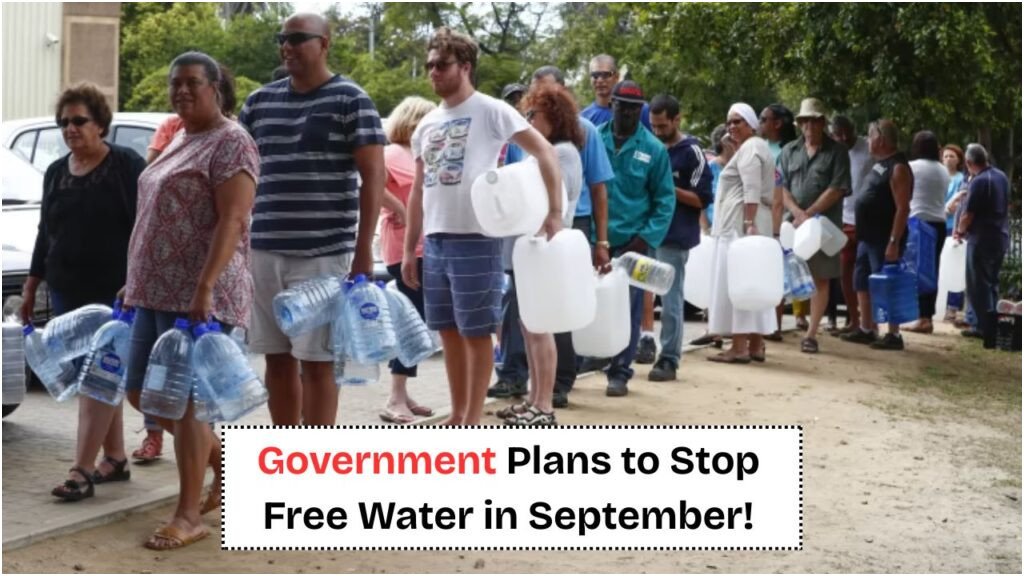South Africa’s Free Water Program Ending: South Africa’s free water program, a vital lifeline for many communities, is set to conclude this September. For years, this initiative has provided a safety net for households, ensuring access to an essential resource without the burden of additional costs. The termination of this program could significantly impact household budgets, especially for low-income families who have relied heavily on this benefit. As the country grapples with economic challenges, the end of free water might exacerbate financial strains and necessitate urgent adjustments in water consumption habits.
Implications of the Free Water Program’s Conclusion
As the free water program in South Africa comes to a close, there are several potential implications for residents. Firstly, households will need to prepare for an increase in monthly utility bills. This change means that families will need to reassess their water usage and potentially reduce consumption to manage costs effectively. Secondly, there may be increased pressure on local municipalities to ensure the provision of water remains consistent and affordable. This shift could lead to greater scrutiny over water management practices and infrastructure investments. Additionally, the end of the program might prompt discussions about alternative ways to support vulnerable communities in accessing essential services.
- Households must plan for higher water bills.
- Potential reduction in water consumption to manage costs.
- Increased demand for efficient municipal water management.
- Discussions on alternative support measures for vulnerable groups.
- Need for public awareness campaigns on water conservation.
- Possible rise in community-driven water initiatives.
- Exploration of sustainable water usage practices.
Understanding the Impact on Household Bills
The cessation of South Africa’s free water initiative will have a direct effect on household bills, necessitating careful financial planning. Many families are likely to experience an increase in their monthly expenses, which could lead to tighter household budgets. This scenario highlights the importance of efficient water usage and the adoption of conservation measures. Households should consider investing in water-saving devices and practices to mitigate the impact on their finances. Furthermore, this change underscores the need for educational programs aimed at promoting water efficiency and supporting families in adapting to the new billing structure.
- Increased monthly expenses for many households.
- Importance of adopting water-saving technologies.
- Need for educational programs on water efficiency.
- Potential challenges for low-income families.
- Greater focus on sustainable water consumption.
- Encouragement for community-based water initiatives.
- Potential rise in demand for water-efficient appliances.
Steps to Manage Water Consumption Effectively
With the end of the free water program, managing water consumption becomes crucial for households across South Africa. Here are a few strategies to help families adjust to the new norm:
- Install water-saving devices such as low-flow showerheads and taps.
- Regularly check for leaks in plumbing systems to prevent water wastage.
- Educate family members about the importance of water conservation practices.
- Consider rainwater harvesting systems to supplement water supply.
- Use appliances like washing machines and dishwashers efficiently by running full loads.
- Explore greywater recycling options for garden irrigation.
- Stay informed about municipal water management policies and changes.
Alternatives to Free Water: Exploring Options
In light of the program’s termination, exploring alternatives to free water is essential for South African households. One potential solution is to engage with community initiatives that promote sustainable water usage. These initiatives could include communal rainwater harvesting or greywater recycling projects. Additionally, households can benefit from government incentives for water-saving technologies. Encouragingly, there are various grants and subsidies available for families seeking to invest in water-efficient appliances. By taking advantage of these opportunities, households can reduce their reliance on municipal water supplies and decrease their monthly bills.
| Alternative | Description | Benefit | Challenge |
|---|---|---|---|
| Rainwater Harvesting | Collecting rainwater for use | Reduces municipal water usage | Initial setup cost |
| Greywater Recycling | Reusing water from baths/sinks | Water conservation | Requires installation |
| Water-Saving Appliances | Devices that use less water | Lower water bills | Upfront investment |
| Community Initiatives | Group-based water projects | Shared resources | Coordination required |
| Government Incentives | Subsidies for water-saving tech | Cost savings | Eligibility criteria |
| Public Education | Awareness campaigns | Informed usage | Behavioral change required |
Preparing for the Shift: Practical Tips
As South Africa bids farewell to its free water program, practical preparations can help households transition smoothly. Begin by auditing your current water usage to identify areas where savings can be made. Implementing small changes, like fixing leaks and optimizing appliance use, can lead to significant improvements in water efficiency. Additionally, consider engaging with local community groups focused on sustainable practices. These groups often provide valuable insights and resources that can support your efforts to adapt to the changing landscape.
- Conduct a water usage audit.
- Fix leaks promptly to avoid wastage.
- Optimize the use of water-dependent appliances.
- Join local sustainable practice groups.
- Share tips and strategies with neighbors.
- Stay updated on water management developments.
- Participate in workshops and seminars on water efficiency.
Exploring Government Support Options
While the free water program is ending, the government may offer other forms of support to alleviate the transition for affected households. These could include subsidies for water-saving appliances, tax incentives for sustainable home modifications, or grants for community water projects. Staying informed about these opportunities is crucial for families seeking to manage their water expenses effectively. Engaging with government programs can provide much-needed relief and ensure that essential water services remain accessible to all South Africans.
| Support Option | Description | Eligibility | Benefit |
|---|---|---|---|
| Appliance Subsidies | Discounts on water-efficient devices | Income-based | Reduces equipment costs |
| Tax Incentives | Deductions for sustainable modifications | Homeowners | Financial savings |
| Community Grants | Funding for local water projects | Community groups | Improves local resources |
| Educational Workshops | Training on water efficiency | Open to all | Improves knowledge |
| Utility Rebates | Refunds for reduced water use | Conservation achievers | Lowers bills |
| Public Awareness Campaigns | Information on resource management | General public | Encourages conservation |
| Infrastructure Investments | Upgrades to municipal systems | Local authorities | Enhances service reliability |
Community Engagement and Water Conservation
Engaging the community in water conservation efforts is critical as South Africa navigates the end of the free water program. By fostering a culture of sustainability, communities can work collectively to reduce water consumption and promote efficient usage. Organizing local events, such as workshops and clean-up drives, can raise awareness and encourage community members to adopt water-saving practices. Collaboration with schools, businesses, and local authorities can further amplify these efforts, creating a robust network committed to preserving South Africa’s water resources for future generations.
- Organize community workshops on water conservation.
- Collaborate with local schools to educate students.
- Host clean-up drives and water-saving challenges.
- Partner with businesses to promote sustainable practices.
- Engage with local authorities for infrastructure support.
- Share success stories to inspire others.
- Create a community water conservation task force.
Leveraging Technology for Water Efficiency
Technology plays an essential role in enhancing water efficiency, offering tools and solutions that can help households adapt to the termination of the free water program. Smart water meters, for instance, provide real-time data on usage, enabling families to monitor consumption patterns and identify areas for improvement. Mobile applications offer tips and reminders for water-saving practices, while online platforms connect users with resources and community initiatives. By leveraging these technological advancements, South Africans can make informed decisions about water usage, ultimately leading to more sustainable and efficient practices across the nation.
FAQ Section
How will the end of the free water program affect my household budget?
With the program ending, expect an increase in your monthly water bills. It’s essential to plan for these changes and consider ways to reduce water usage.
Are there any government incentives for water-saving technologies?
Yes, there are subsidies and incentives available for investing in water-efficient appliances and home modifications.
What steps can I take to manage water consumption effectively?
Consider installing water-saving devices, fixing leaks, and educating your family about the importance of conservation.
How can communities support water conservation efforts?
Communities can organize workshops, collaborate with local schools, and engage in projects that promote sustainable water practices.
What technological tools can help with water efficiency?
Smart water meters, mobile apps, and online platforms can aid in monitoring usage, providing tips, and connecting with conservation initiatives.





